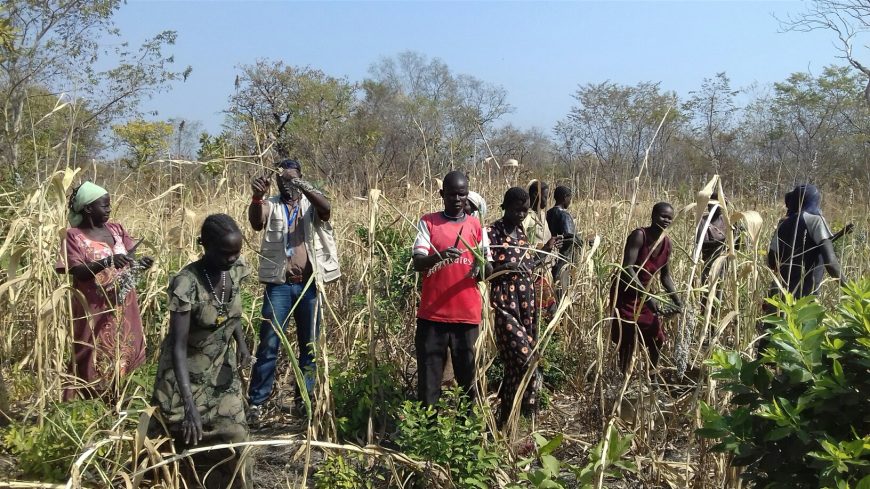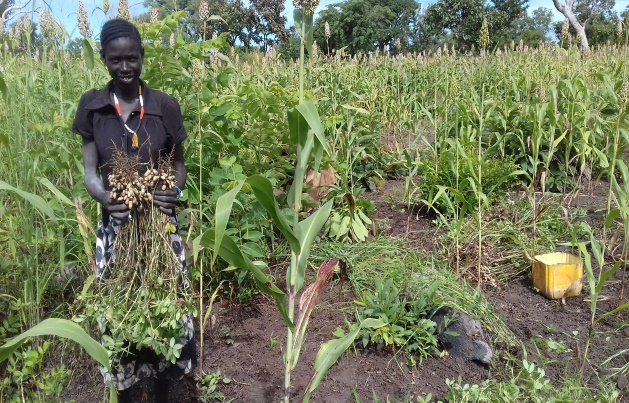
Development in South Sudan is curtailed by the ongoing widespread conflict coupled with very high levels of food insecurity and derailed economic progress. Conflict has led to significant displacements of populations from both urban and rural areas, with the most impact being felt in rural communities, which are conducive for agriculture and livestock production - but this production has been hindered. During this year’s International Day for Rural Women, ACTED recounts the role rural women of South Sudan play to ensure survival and progress in their communities.
Consequences of traditional gender norms
Not only do women work extra hours in a day, tending after their families without any pay, but women in rural areas of South Sudan do so amidst the most extreme circumstances, and with very little expectations. From engaging in daily households duties to taking care of children, the elderly, sick, people with disabilities, and tending to livestock, women burst their backs in farms in order to put food on the table. These duties are physically challenging and emotionally draining, not to mention time consuming. This leaves them with barely enough time to take care of themselves, or participate actively in community politics. The latter, is a role reserved only for men in say, Akobo and Tonj South, where it is considered a taboo for a woman to address a group of men.
Forging forward, progress-oriented, unperturbed by surrounding inequalities
When an ACTED team visited Asunta, a 25-year old mother of three boys and three girls, they have to interrupt her sorghum harvesting session. She is deeply engrossed in the farm, humming in a beautiful voice, depicting happiness and peace of mind. It is quite intriguing how she thrushes the sorghum heads at a remarkable speed and moves swiftly to the next plant, almost missing the presence of the team. She is one of the beneficiaries of ACTED’s BRACED resilience project funded by DfID in Tonj South. She turns around and exchanges pleasantries with the team, quickly apologizing for not noticing them earlier. With a warm handshake, she leads them to her hut, which is 400 metres from her husband’s farm. One can tell from the clean and well organized homestead that Asunta is not only responsible, but also wise. She explains that her secret to handling all homestead chores and the farm is learning to manage her time wisely. This involves waking up before everyone else and going to sleep last.
When I got married, I knew I had to take good care of my family as is the role of women in the community. We are nurturers and I am happy to have a peaceful home
Though she lives with her husband and their children, she says she has learned not to rely on his support to provide for the family because life has become increasingly unpredictable. From ACTED’s project, she has gained a lot from lessons on modern farming, and as a result she has diversified her crops to include groundnuts, maize and sorghum. Asunta believes in spreading her risks in anticipation for hard times. When she is not working in her husband’s farm she gathers bundles of grass for sale to diversify her household income. When the team implores on how she uses money earned, she chuckles and waves her right arm across her face in wishful thinking, “My husband makes decisions on how we spend money that we both get. I give every coin I earn to him to make such decisions.” However, she is quick to add that her husband supports her and makes smart decisions. She is happy that her husband respects her and increases their livestock in times of plenty.

Despite her hardwork and dedication to her family, Asunta is one of the many women who barely own any assets at their households due to cultural norms that discourage ownership of property by women. Asunta discloses, “My culture has since prohibited us from owning property and assets in the family, but we are allowed to acquire and manage the assets like small ruminants. For example, I bought 3 goats and 4 chicken with the profit I made from the sale of vegetables last season. However, I had to get my husband’s approval to do so”. Asunta’s narrative is quite common in rural areas, where women are real champions and agents of transformative change. Asunta says, “Spouses should be sensitized to recognize our hard work and allow us participate in household and community planning activities.” However, restrictions on asset and property ownership remain impediments to independent thought, which could reflect poorly on a community dominated and driven by male voices only. ACTED works with such rural communities to change their mindsets through comprehensive and well integrated projects that challenge existing norms. Through the inclusion of adequate representation of women in agro-pastoral field schools where inclusive learning is experienced, the community is slowly accepting women as individuals with clear strategies and plans that can lead to the development of the whole community.